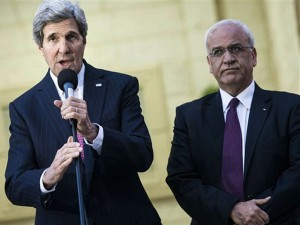
US Secretary of State John Kerry, left, makes a statement to the press as Palestinian negotiator Saeb Erekat listens after meeting with Palestinian President Mahmoud Abbas at the presidential compound in the West Bank city of Ramallah on Saturday, Jan. 4, 2014. AP
JERUSALEM – US Secretary of State John Kerry is to fly to Jordan and Saudi Arabia Sunday seeking backing for his plans for Middle East peace, after insisting he has made progress.
After a second meeting with Palestinian leader Mahmud Abbas in the West Bank, Kerry swept back to Jerusalem for his third discussions with Israeli Prime Minister Benjamin Netanyahu in three days.
“We’re not there yet, but we are making progress,” Kerry said Saturday, adding everyone was “working with great intensity” to try to reach a peace deal.
Speaking to reporters in Abbas’s Ramallah headquarters, Kerry announced he would also travel to Jordan, which borders the West Bank, and to Saudi Arabia on Sunday for talks with the kings of both nations.
“I’m confident that the talks we’ve had in the past two days have already fleshed out and even resolved certain kinds of issues and presented new opportunities for others,” he said.
“We are beginning to flesh out the toughest hurdles yet to be overcome.”
Jordan is only one of two Arab countries to have signed a peace treaty with Israel, and King Abdullah II holds a special position because the 1994 accord recognizes his country’s “historic” role in caring for Muslim holy sites in east Jerusalem.
Saudi’s King Abdullah also plays a key role, as the Gulf kingdom was the author of an Arab League peace initiative.
Direct Israeli-Palestinian negotiations had been frozen for almost three years, but after intense diplomacy by Kerry the two sides agreed to resume talks in July and vowed to remain at the table for nine months.
But his 10th trip to the region has been clouded by bitter recriminations between Israeli and Palestinian leaders.
Palestinian negotiator Saeb Erakat sought to counter criticism from Netanyahu that the Palestinians were not serious about peace.
“No-one stands to lose more from failure than the Palestinians,” Erakat told reporters, saying Kerry was doing everything to achieve “a state of Palestine to live side by side with the state of Israel in peace and security in the 1967 lines.”
“Failure to us is not an option. We really are doing everything humanely possible to ensure the success of Secretary Kerry.”
And he urged Israel to “refrain from any acts that may prejudice us or preempt the outcome of permanent status negotiations, i.e. settlement activity and home demolitions.”
‘Pressure to recognize Jewish state’
With the late April deadline looming, Kerry has pledged to work even more intensively in the coming months, seeking first to agree a framework to guide the talks.
US officials have refused to release any details about the proposed framework, and Kerry acknowledged it would not be agreed during this trip.
But a Palestinian source, who is close to the negotiations but asked to remain anonymous, told AFP that Abbas had come under pressure to agree to recognize Israel as a Jewish state.
Abbas refused.
Palestinian hopes of having an international force brought in to help patrol the Jordan Vally under a peace deal had also been sidelined, the source added.
Instead the US was proposing a mixed Israeli-Palestinian military presence to ensure security in the area which borders Israel, without setting a deadline when the Israeli troops would be withdrawn.
Kerry has said a peace treaty will deal with all the core issues dividing the two sides. These included the contours of a future Palestinian state, refugees, the fate of Jerusalem claimed by both as a capital, security and mutual recognition.
“Kerry proposed a new formula to resolve the issue of Jerusalem, but it’s not clear and is ambiguous, and therefore we can’t accept,” the Palestinian source added.
Under the proposal, a unified Jerusalem would be the capital of both states without defining the outlines of east Jerusalem, the official said.
Netanyahu had apparently agreed to the idea.
The Palestinians want the borders of their state to be based on the 1967 lines from before the Six-Day War, when Israel captured the West Bank, including now annexed Arab east Jerusalem.
They have also insisted there should be no Israeli troops in their future state.
But Israel wants to retain existing settlements it has built inside occupied Palestinian territory. It also wants to maintain a military presence in the Jordan Valley.